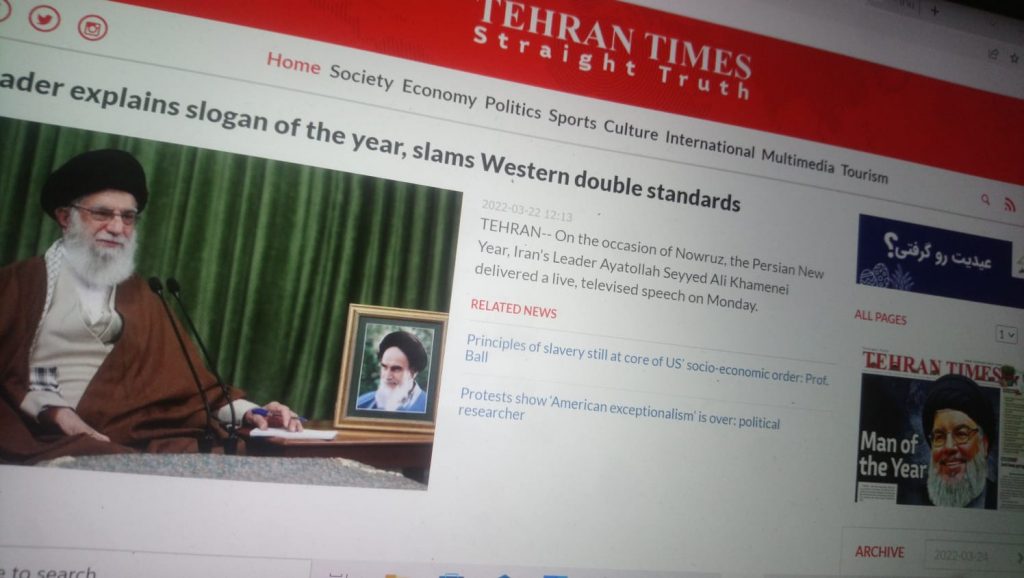בנאומו השבוע המעיט המנהיג שעומד בראש המדינה והחברה האיראנית, בהשתלחות כלפי אויבי איראן. ביקורתו על המערב, נסבה בעיקר על גילויי הגזענות אשר חבויים בו, כאשר המערב לדבריו מתייחס למצוקת לבנים באופן אחד, ולמצוקת שחורים באופן אחר. ביקורת כזאת נשמעה אגב השבוע גם בממשלת ישראל מפי השרה תמנו שאטה, על ההבדל בין היחס למלחמה באוקראינה לבין היחס למלחמה באתיופיה באמרה: זוהי צביעות של האדם הלבן. עלי חוסייני חמנאי, אמר את דבריו ארבעה ימים אחרי שנשמעו בממשלת ישראל.
במקום מטבעות הלשון השגורות, של שנאה זעם וחמת רצח, התמקד הפעם המנהיג האיראני בכלכלה האיראנית, והרים אותה לראש סדר העדיפויות של החברה והממשל האיראניים. יתכן כי השפעתה של ישראל, אשר כלכלתה הפורחת הביאה אותה אל השורה הראשונה של המדינות בעולם המפותח, ולסף של היות מעצמה אזרחית*, משפיעה עמוקות על איראן, ועל המנהיג האיראני, השפעה אשר יתכן כי באה לביטוי בנאום.
את נאומו נשא עלי חמנאי לרגל ראש השנה הפרסי הזרתוסטרי, שחל בסוף חודש מרץ במועד שמבטא את תחילת האביב; זהו מועד ותרבות שקדמו במורשת האיראנית, למועדי האסלאם, ונהגו בימי כורש למשל, שחידש את ריבונות ישראל על אדמתו. יתכן שגם לכך יש חשיבות, מעבר להדגשת המורשת המעצמתית של איראן, אשר עלי חמינאי מדגישה בעצם נאומו במועד לא אסלמי אלא פרסי אימפריאלי; הוא עושה כך אף כי מועדים זרתוסטריים אינם אהובים על מנהיגים אסלמים איראניים רבים, שרואים התנגשות ערכים בין מועדי הזרתוסטרא למועדי האסלאם.
ויש לומר: לפי שעה מעשיה הצבאיים של איראן, לא מתיישבים עם נאום אזרחי מובהק. אך צריך גם לומר שהאסטרטגיה הישראלית שרואה את איראן דרך כוונות הרובים בלבד, גם היא לא מתיישבת עם השקפה אזרחית מובהקת. ואולי חוסר הבהירות של הנאום, נובע מהמציאות האזורית הזאת.
*מעצמה צבאית קולוניאלית ישראל לא יכולה להיות מסיבות תרבותיות וגיאוגרפיות והיקפי אוכלוסייה, אף כי לא פעם שגתה באשליות על כך, בעברה הקדום ובעברה המודרני.

In his speech this week, the leader who heads the state and Iranian society downplayed the outburst against Iran's enemies. His critique of the West, revolved mainly around the manifestations of racism that are hidden in the West, When the West, he says, refers to the plight of white people in one way, and the plight of black people in another. Such criticism was also heard in the Israeli government this week from Minister Tamanu Shatta, about the difference between the attitude to the war in Ukraine and the attitude to the war in Ethiopia in saying: This is the hypocrisy of the white man. Ali Husseini Khamenei made his remarks four days after they were heard by the Israeli government.
Instead of the usual expressions of hatred, anger and bloodlust, this time the Iranian leader focused on the Iranian economy, making it a top priority for Iranian society and government. It is possible that the influence of Israel, whose booming economy has brought it to the forefront of countries in the developed world, and the threshold of being a civilian power *, has a profound effect on Iran, and on the Iranian leader, an influence which may be expressed in speech.
Ali Khamenei delivered his speech on the Zarathustra Persian New Year, which took place at the end of March at a time that marks the beginning of spring; This is a date and culture that preceded during the Iranian heritage, the days of Islam, and was practiced in the days of Cyrus for example, who renewed Israeli sovereignty in the Land of Israel. This may also be important, beyond emphasizing Iran's powerful heritage, When Ali Khamenei emphasizes his speech at a time not Islamic but imperial Persian; Ali Khamenei does so even though Zarathustra dates are not favored by many Iranian Islamic leaders, who see a clash of values between Zarathustra and Islam dates.
And it must be said: for the time being, Iran's military actions do not reconcile with a clear civilian speech. But it must also be said that the Israeli strategy that sees Iran through the telescopic cross of guns only, also does not reconcile with a clear civilian view. And perhaps the ambiguity of the speech, stems from this regional reality.
* Israel cannot be colonial military power for cultural and geographical reasons and population size, although it has often erred in illusions about it, in its ancient past and modern past.
